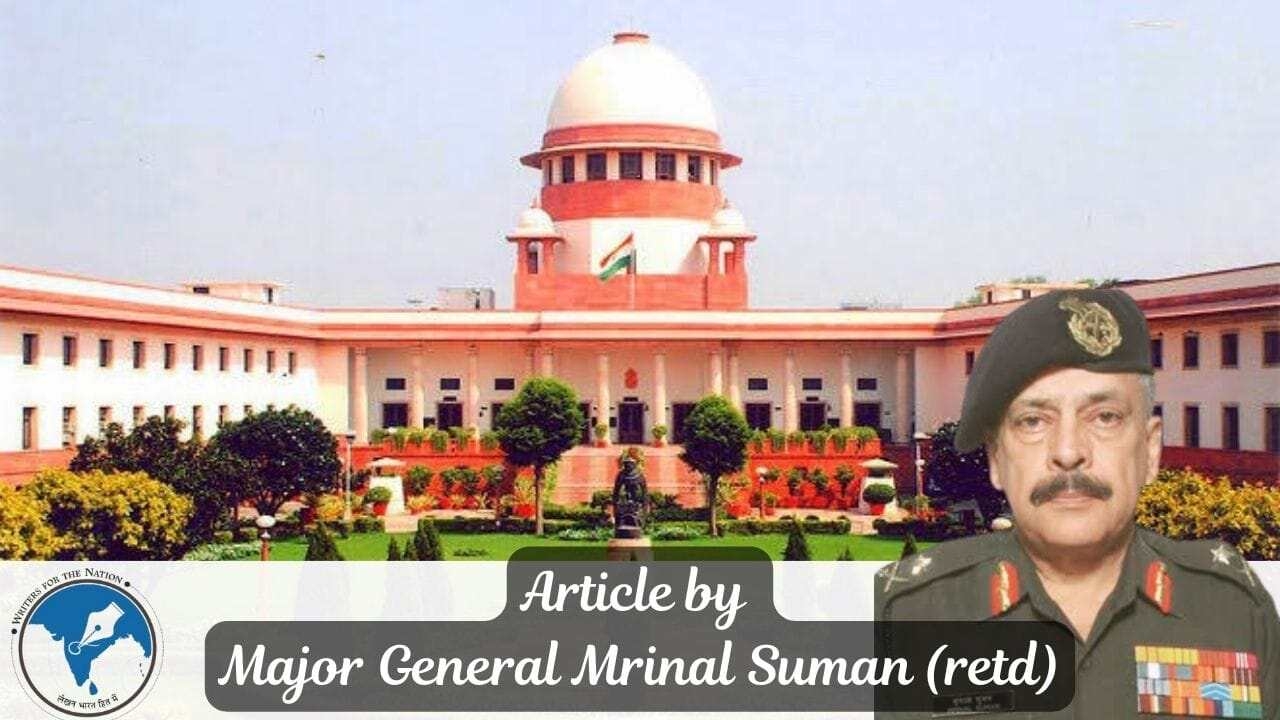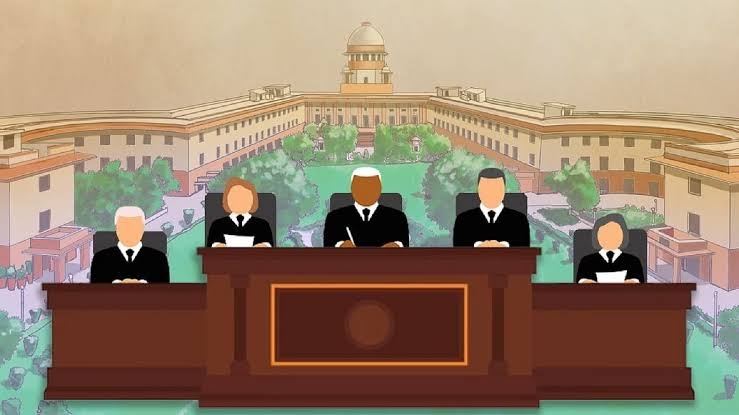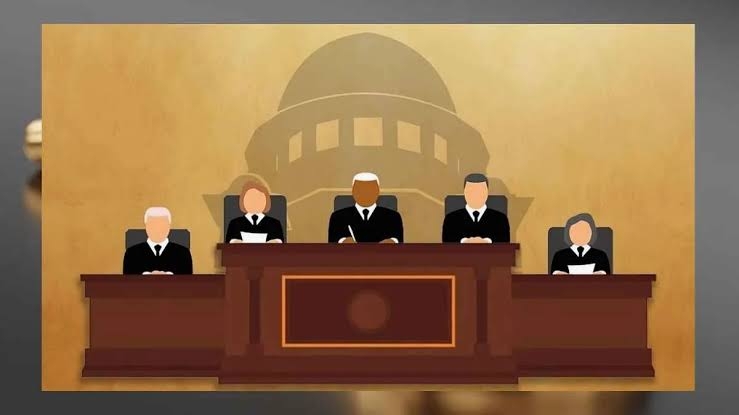India’s Higher Judiciary: Collegium System Breeds Arrogance

I am a 79-year-old war veteran. I keep wondering as to why our judges behave the way they do. Have they unilaterally appropriated powers to be the supreme authority in the country, even above the Constitution?
Why do the judges think that they have a right to scold, threaten or use offensive language against the citizens of this country? Under what law can a judge threaten to rip a citizen apart? In another case, instead of appreciating the threat faced by a lady, she is castigated publicly, “She faces threats or she has become a security threat?”, and “It is shameful. She should apologise to the whole country!"
It is only in India that the highest court grants unsolicited bail to an accused of financial misdemeanours to carry out election campaigning. A woman activist is granted bail late in the evening by constituting two benches. Look at the wilful humiliation of a world-renowned exponent of Yoga and Ayurveda, ostensibly at the bidding of the anti-Ayurveda lobby.
A word about their haughty demeanour will be in order here. The infamous collegium system is to blame for this malaise afflicting our higher judiciary. India is the only country where judges select themselves in a secret conclave.
The judges know that they owe their selection to the parochial ‘Chacha-Bhatija’ nepotism and not to any merit-based selection. Worse, they know that the countrymen know it as well. Although the judges do not appear apologetic publicly; sub-consciously, they feel embarrassed/sheepish about their mode of selection, making them suffer from an inferiority complex.

Inferiority complex is characterized by constant feelings of inadequacy. When an individual finds himself ill-equipped to occupy a chair, a sense of acute inferiority complex afflicts his psychology. The malady becomes a pathological disorder when a sense of inadequacy overwhelms his personality and makes him behave in an unbecoming manner.
It is universally accepted that outward display of superiority/arrogance is a psychological defence mechanism to conceal feelings of inferiority. The resultant urge to masquerade as superior and confident beings makes many develop a hubristic demeanour. This explains the behaviour of our judges.
Urgent Need for Corrective Steps
India can never thrive as a vibrant democracy if the higher judiciary is seen to be failing the country. Therefore, it is time that to take some radical corrective steps.
First of all, the nomenclature Supreme Court of India is incongruous. In fact, it is illogical and misleading. The term ‘Supreme’ conveys unbridled power and ultimate authority. It gives a false sense of supremacy to the judges who start believing that they are really ‘Supreme’ and no one is above them.

In a democracy, only the people are ‘Supreme’ and no one else. ‘We, the people of India’ have given ourselves a constitution, and the judiciary is a creation of that constitution. How can SCI be ‘Supreme’ when it owes its creation and very existence to the will of the people? Moreover, it is public tax-money that finances their pay, perks and pensions. They are employees of the country and not its masters. People have a right to question their performance. Instead of ‘contempt of court’, the judiciary should be held responsible for ‘contempt of people’ when it resorts to inappropriate conduct.
Therefore, it is strongly suggested that the Supreme Court be stripped of the word ‘Supreme’. For, only the people of the country are supreme and judiciary is answerable to the people. It will be more appropriate to call it as Apex Court of India.
Two, the collegium system must be abolished it is an anathema to democracy and is symptomatic of acute judicial superciliousness. When the Supreme Court annulled the National Judicial Appointments Commission (NJAC) Act and the 99th Constitutional Amendment in October 2015, it dealt a death blow to constitutional and judicial propriety – adjudicating the case of NJAC in its own favour, despite the well-established principle of natural justice “Nemo iudex in causa sua”, i.e. no person shall be a judge in his own cause.
Three, power to legislate laws rests with the legislature. Judiciary should have no power to overrule a law passed by the parliament. It cannot usurp the authority of the peoples’ representatives. Take the case of Electoral Bonds. How can five self-opinionated judges come to the conclusion that they possess far more wisdom than all the duly elected representatives of the people. The apex court should step in only, and only, when the fundamental structure or essence of the constitution is impacted.
Four, far too much time is being wasted in entertaining infructuous PIL. Filing of PIL is an industry and a remunerative one at that. A vast eco-system is thriving on it. There is a coterie of senior well-connected advocates who thrive on such litigations. Courts know that PILs have become a tool for settling political scores, yet such PILs are admitted, wasting valuable court time.
Five, the judges should confine themselves to legal matters only. Forgetting the distinction between social evils and matters of faith, they unnecessarily generated animosity amongst various sections of the populace in the case of Sabarimala. Their ill-advised intervention in Shaheen Bagh blockade and the farmers’ agitation created immense problems for the government and restricted its manoeuvrability to find speedy solutions. Some of their verbal remarks on unrelated matters surprise all.
Six, there should be an annual performance audit of the judiciary by an independent statutory body. The countrymen have a right to know as to why we have a massive backlog of court cases. Lakhs of litigants are suffering delays. Can the judiciary explain such an abysmal state of affairs? What steps are being taken to expedite pending cases?
Finally, there is a need to change with the times. India’s higher judiciary continues to follow the dress code prescribed by the British. Dress exerts profound psychological and behavioural influence on the wearers. Black coats expect the judges to behave like demi-gods, considering themselves above all others, giving rise to a sense of invincible superiority and associated arrogance. Why cannot a judge be dressed in a less menacing dress?
Similarly, why continue with the salutations like ‘my lord’, ‘your lordship’ or ‘your honour’. Such terms were a relic of the colonial era and a sign of slavery. The only requirement is that the judges be addressed in a respectful and dignified manner.
Finally
In broad terms, a coup is defined as an illegal seizure of power. Whereas coups are generally associated with the overthrow of constitutionally established governments by the military, there are many other types of unilateral seizures of power. As per the Wikipedia, such transgressions are called coups with adjectives. Judicial coup falls under this category. It implies unconstitutional usurpation of power by the judiciary. The collegium system is nothing but a de facto judicial coup with serious constitutional implications. The judiciary has hijacked the system to become uncrowned rulers of the country. The then Finance Minister, Arun Jaitley, rightly called it “tyranny of the unelected”.
Finally, the judiciary must appreciate that respect and trust cannot be extracted through coercion or the threat of contempt of court, it has to be earned through above-board conduct. Equally importantly, judiciary must understand that it is not empowered to administer the state. For, only people’s elected representatives get mandate to govern the country; and that is the essence of democracy.
Note: This article reflects the personal opinion of the writer.
Article by
Major General Mrinal Suman (retd)
AVSM, VSM, PhD, commanded an Engineer Regiment in the Siachen-Kargil sector.